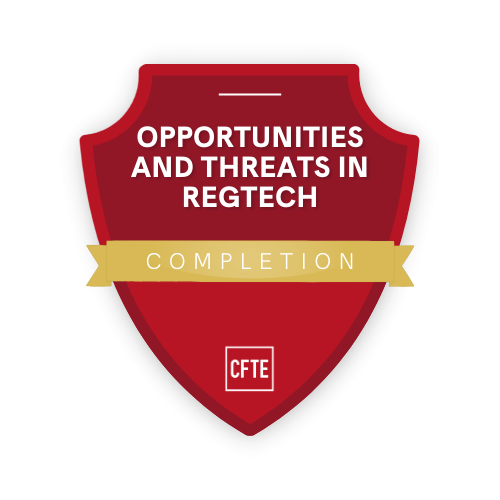FINTECH & INNOVATION
Opportunities and threats in RegTech
Explore how RegTech boosts financial compliance efficiency through analytics and machine learning. Understand challenges like cybersecurity and global regulations, and discover RegTech's role in transforming financial services regulation.
Write your awesome label here.
Analytics
Compliance
Cybersecurity
Sustainability
Adaptability
Course Lessons
Sustainability
Chapter 1 examines the evolution of finance and regulatory technology (Regtech) over the past decade, highlighting the transformative impact of the 2008 crisis, subsequent regulation, and technological advancements. The chapter outlines how these factors have converged to drive a focus on sustainability within financial compliance, with an emphasis on cybersecurity, data protection, and adherence to the UN Sustainable Development Goals (SDGs).
From KYC to KYD
Chapter 2 explores the transition from Know Your Customer (KYC) to Know Your Data (KYD) in the context of financial regulation, emphasising the need for improved risk management and IT compliance systems due to digitisation. It highlights the shift towards data protection, the importance of algorithmic compliance in capital regulation, the focus on financial networks over stability, the promotion of good behaviour within financial entities, a proactive rather than reactive regulatory approach, and the movement from traditional reporting to API compliance in response to technological advancements.
The Regulation of TechFin
Chapter 3 delves into the regulatory implications of 'TechFin,' where technology firms enter the financial services sector, leveraging their vast user bases and data-driven approaches. This shift challenges traditional financial institutions and requires a new focus on how data is regulated, how tech firms integrate financial services, and how regulations adapt to these changes, considering the growing trend of non-bank companies like retailers and manufacturers offering financial services to enhance customer experiences.
Tech Risk
Chapter 4 discusses how digitisation and datafication have introduced new technological risks (tech risks) into the financial sector, significantly impacting RegTech, which aims to address the compliance challenges posed by these risks.
Globalisation and Fragmentation
Chapter 5 examines the tension between the globalisation ideal in RegTech, which seeks uniformity in regulatory standards across borders, and the reality of regulatory fragmentation, where differing local regulations necessitate more complex and potentially costly compliance solutions.

Meet your instructor - Douglas Arner
Investment Manager at Tokentus



